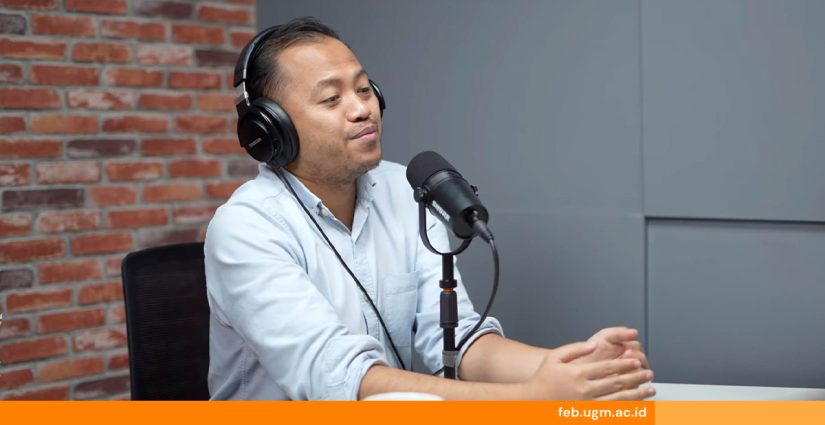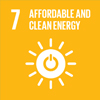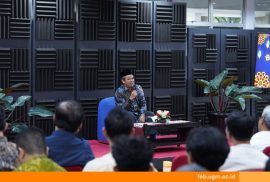
The issue of Environmental, Social, and Governance (ESG) is gaining increasing attention in the business world. Companies are now required not only to present reliable financial statements but also to disclose their sustainability efforts and initiatives. However, a significant question arises: how can we ensure that sustainability reports are truly credible and trustworthy?
Ahmad Zaki, S.E., M.Acc., Ph.D., Lecturer at the Accounting Study Program, Faculty of Economics and Business Universitas Gadjah Mada (FEB UGM), explained in a recent podcast titled “ESG Assurance: Is Auditing Sustainability Reports Necessary?” that sustainability reports, including CSR reports, have not yet formally received assurance from Public Accounting Firms (KAP).
“When a KAP audits a company’s financial statements, the audit only covers the financial reports. If there is a sustainability disclosure included, the sustainability report itself does not receive assurance,” explained Zaki, who specializes in social and environmental accounting.
Rijadh Djatu Winardi, S.E., M.Sc., Ph.D., CFE, also a lecturer at the Accounting Study Program FEB UGM, added that assurance for sustainability reports is not the same as financial audits that result in an audit opinion. According to him, ESG assurance is more of a limited review of disclosure aspects. He emphasized that increasing investor demand has encouraged companies to be more active in disclosing ESG information.
“Investors now want to see the extent to which companies comply with ESG principles, especially in relation to financing. Additionally, there is pressure from regulators in developed countries. The European Union already has a CSR Directive, while in the United States, the SEC has even proposed climate disclosure rules,” said Rijadh.
Meanwhile, Zaki mentioned that at the international level, there are financial reporting standards, namely IFRS S1 and IFRS S2. Indonesia has also set up the Sustainability Accounting Standards Board, which will adopt these global standards.
“Once these standards are in place, the form of assurance for disclosure will be more systematic because there will be a clear reference,” said Zaki.
However, Zaki also warned of potential issues if these standards are treated merely as “boxes to tick” by companies. He stressed the importance of adaptive standards. According to him, companies should not only chase compliance but must preserve the substance of genuine social, environmental, and governance activities.
“The standards board must work hard to create evolving standards that truly help accelerate goals such as reducing greenhouse gas emissions or mitigating the impacts of climate change,” he emphasized.
Rijadh added that one of the critical global initiatives is the issuance of ISA 5000 (International Standard Sustainability Assurance). This standard, according to him, is principle-based rather than rule-based. It means it is not a set of rigid procedural steps but instead emphasizes principles and outcomes. As such, the scope of assurance is more flexible while demanding professional judgment in the planning and execution of assurance engagements.
“This is what makes ISA 5000 interesting. Assurance can take the form of limited assurance or reasonable assurance, depending on the needs,” Rijadh explained.
Zaki further noted that the existence of ISA 5000 is highly relevant because companies may use different frameworks in preparing sustainability reports, such as the Global Reporting Initiative (GRI), IFRS S1 and S2, or other frameworks. It means that assurance providers must understand a broad spectrum of frameworks.
“Sometimes this can make assurance practitioners feel burdened, since clients may come with different standards. However, upon examining the substance, the issues remain the same: environmental, social, and governance matters. The difference lies only in the language and emphasis,” he said.
According to Rijadh, this is the challenge that accounting students and future assurance practitioners must be prepared for. Knowledge of various frameworks is essential so they can handle complexity in practice.
However, Zaki emphasized that differences in frameworks should not create fear among students or practitioners. The substance remains the same, even if presented through different frameworks.
ESG assurance, Zaki continued, brings numerous benefits, including enhancing the credibility of sustainability reports, improving compliance, and fostering investor trust.
“There are indeed challenges, ranging from the diverse complexity of industries, data quality, to the availability of information. Companies still face data gaps. But this is exactly where assurance professionals play a crucial role,” he explained.
The full podcast “ESG Assurance: Is Auditing Sustainability Reports Necessary?” can be accessed via: AsuranESGPerlukahAuditLaporanBerkelanjutan
Reporter: Orie Priscylla Mapeda Lumalan
Editor: Kurnia Ekaptiningrum
Sustainable Development Goals











